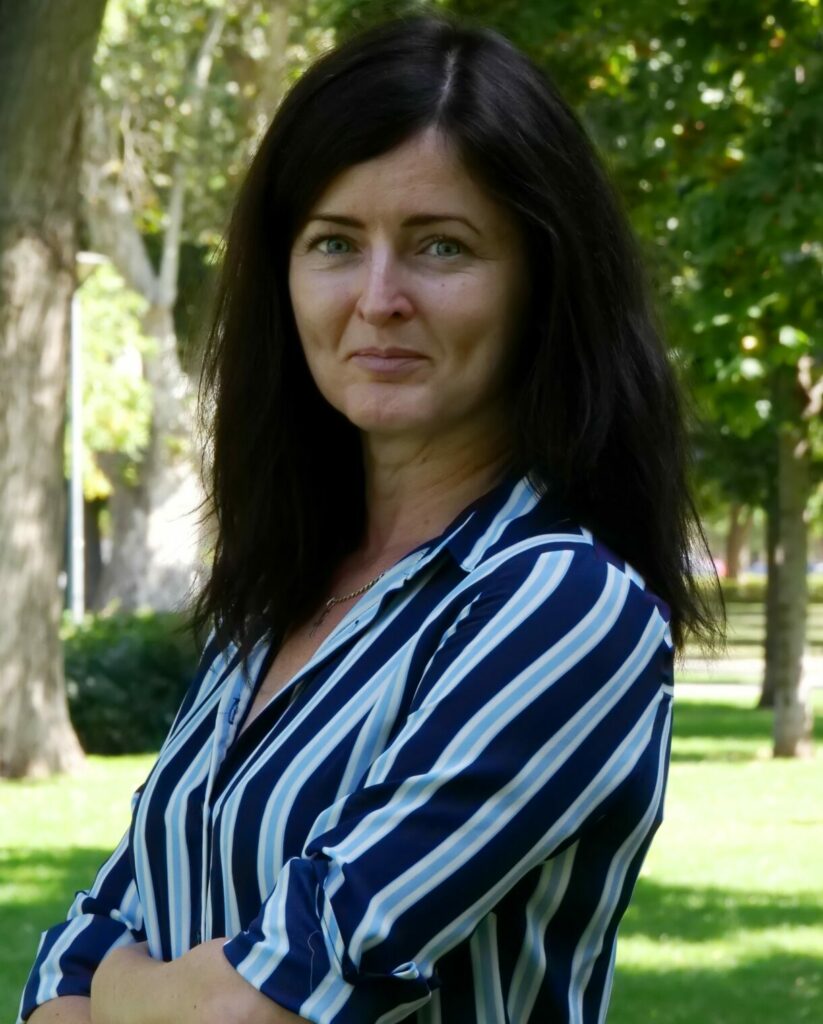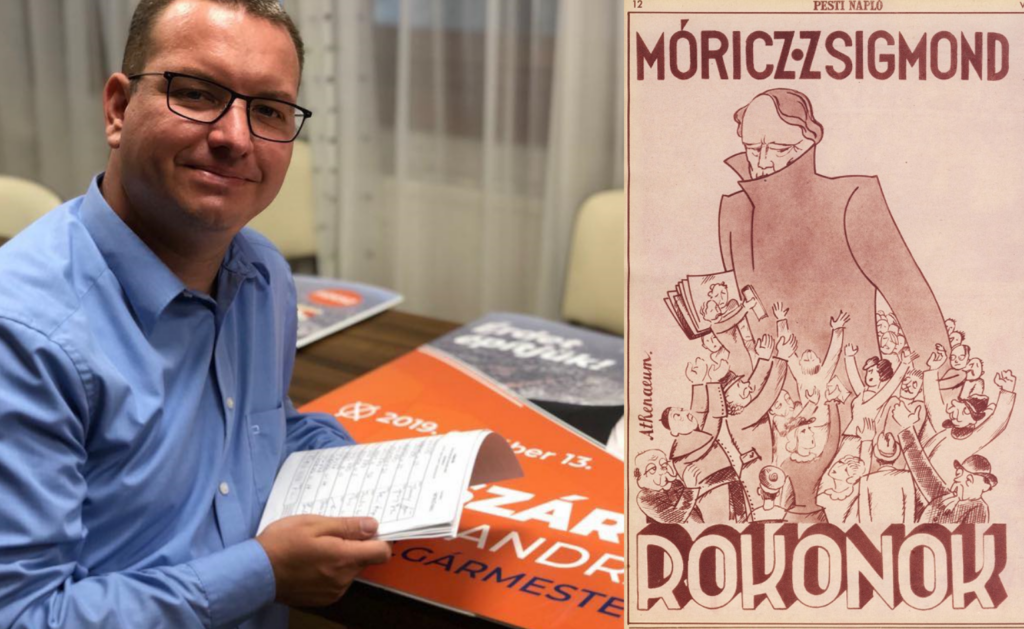The https://english.atlatszo.hu use cookies to track and profile customers such as action tags and pixel tracking on our website to assist our marketing. On our website we use technical, analytical, marketing and preference cookies. These are necessary for our site to work properly and to give us inforamation about how our site is used. See Cookies Policy
Long dead writer helps us win lawsuit against local Fidesz politician who denied his kinship
Over the past few years, we have published a series of articles exposing the irregularities in the public tenders for the construction of kindergartens in the city of Érd. One of them is that the owner of the construction company is related to István Bács, the former deputy mayor of Érd: the businessman’s brother married the Fidesz politician’s sister. We reported this, and then Bács sued us, saying it was a lie that he and the contractor were relatives. He won the case at first instance, but the court of appeal ruled in favour of Átlátszó.
In the lawsuit, we essentially argued that if we had used the term ‘relative’ incorrectly, then the title of the famous Hungarian writer Zsigmond Móricz’s well-known novel Relatives would also be a lie. Fortunately, it is not, and Bács and the businessman are also related according to the court.

At the end of June last year, we published an article entitled “The Érdi scandal: one man wrote the “competing” kindergarten offers”. In it we reported that according to an investigation report, the same user was the author of the bids of the supposedly competing invited companies in the public procurement of the construction of the kindergarten in the city of Érd.
The story was part of a series of articles we started in 2019, in which we explored the controversial and anomalous details of the kindergarten projects in Érd. We wrote, for example, that the same companies were regularly invited to participate in public tenders, but their selection and the market analysis that preceded it were not documented – because apparently no such analysis was done.
Related company won the most tenders
We discovered that the winner and biggest beneficiary of the public procurements of the kindergarten construction is the company whose owner is related to the then Fidesz deputy mayor responsible for kindergarten issues, István Bács. The owner of General-Invest Bau Ltd., Zoltán Steierlein, has a brother, Balázs, who is the husband of Bács’s sister Ildikó.
The impressive success of the construction company can be seen when we look at its results from 2019: with a net sales of 1.7 billion, the company – with an average of 14 employees – has made 727 million HUF profit after tax. In the same year, the profit-to-sales ratio of General-Invest Bau Ltd. was 42%, which is remarkably high. According to surveys made by the organisation of construction contractors, the average profit rate of the entire sector was around 8 percent, and it also includes companies which are close to the government.
Construction company linked to the former Fidesz deputy mayor in Érd reached 42% profit rate – English
The mayor of Érd has decided to sue the local construction company, which won a nearly 280 million HUF public procurement in 2017 under suspicious conditions. The company, named General-Invest Bau Kft.
Bács went to court
After one of our articles on the subject, István Bács sent a request for a correction to Átlátszó in early July last year: he wanted us to correct him on the fact that he was not related to the owner of General-Invest Bau. We did not comply with his request, so he went to court. So the lawsuit was about to whom the word ‘relative’ can be used when a journalist writes about public money and public officials.
The Court of First Instance started from the fact that the Civil Code does not define the meaning of the word ‘relative’, but only the definition of ‘close relative’, which does not fit the relationship at issue in the case.
The Hungarian Interpretative Dictionary is not helpful in this respect either, since it only refers to descent from a common ancestor, i.e. a blood relation or a family relationship arising from marriage.
This is obviously not at play in the Érd case, as not the company director did marry the politician’s sister, and the company director’s brother did not marry István Bács – the latter of course could not have done so by Hungarian law.
We quoted a famous Hungarian novel
We argued that the concept of kinship in the common language is much broader than that. To prove this, we also quoted from the novel Relatives (in English edition Relations) by Zsigmond Móricz, one of the most famous Hungarian writers, in our appeal. We pointed out that if we use the Hungarian language incorrectly, Móricz was also wrong to give the title to one of his best-known novels, which focuses on the corruption of a small town, full of complicated family ties.
In our view, the trial court erred and we have appealed against the judgment. In our appeal, we explained that Hungarian law (including the Civil Code) uses the concept of a relative in the direct line in its definitions of ‘relative’ and ‘close relative’, but the fact that they are related to each other by blood and marriage does not mean that no one else can be related to them.
We have also referred to the fact that “In accordance with settled case-law in press litigation, the contested communication must be judged by reference to the typical knowledge of the public who receive the media content, in this case the average newspaper reader, and the meaning it conveys to him, that is to say, it is not the legal definitions but the colloquial meaning of the words that is of primary importance.”
As we wrote in our appeal, “when the nature of the relationship is easily transparent without explanation, when there are few (in this case three) close family links from one person to another, or when two persons share a close blood relative (as in the present case, where István Bács and Zoltán Steierlein are both uncles of the child of Bács’ sister), the word ‘relative’ is generally used in common parlance to describe the relationship”.
We could not avoid Zsigmond Móricz’s novel Relatives in our interpretation of small-town public life and personal networks of interests and entanglements, so we referred to it in our appeal. We cited that the much mentioned degree of kinship between the main character, István Kopjáss, and the bank director Kardics, is that Kopjáss’ father’s cousin (i.e. Kopjáss’ second aunt) was Kardics’ mother-in-law. Another character, the leader of the opposition, is probably the second, but more likely third cousin of the prosecutor general on his maternal great-grandmother’s side, presumed on the basis of a common ancestral name, but they are referred to as related.
We believe that here, in Móricz’s country, it is not possible to start from the assumption that kinship stops where the Civil Code’s concept of relatives stops. And certainly not from the fact that a public article does not call kinship that goes beyond the circle of relatives under the Civil Code by only one sibling relationship. Therefore, if the conclusion of the judgment of the Court of First Instance were correct, Móricz would have to be regarded as an incompetent user of language in the Relatives on a point which goes to the heart of the work, which would be patently absurd.
In the end we won, they really are relatives
The Court of Appeal of Budapest, acting in the second instance, emphasised that “the court of first instance did not take into account that the article in the case reported on a matter of public interest, in which case the statements enjoy a higher degree of freedom of expression. It did not take into account the fact that the piece was published as part of a series of articles”.
The Court of Appeal recalled that the Constitutional Court, in its judgments in similar cases, had started from the premise that the protection of freedom of expression on public matters is essential for the formation of democratic public opinion.
The second instance also took into account that our story at issue was part of a series of articles that had been following the public procurement of kindergartens in the city of Érd since 2019. István Bács was a central figure in these public procurement procedures, as he was the deputy mayor in charge of kindergarten affairs.
The Court of Appeal ruled that the first instance judgment had only taken into account the definition of relatives in the Civil Code, but the concept of kinship in common parlance covers a broader and more varied system of personal relationships.
According to the court, the general public perception considers the personal relationship outlined in the lawsuit to be a family relationship, since the father of the politican’s sister’s child is undoubtedly a close relative of the owner of the company.
According to the judgment of the Court of First Instance “The fact of this relationship in itself establishes a relationship of kinship, irrespective of whether the persons concerned are actually in contact with each other.”
Asset declaration procedure initiated against former Fidesz deputy mayor of Érd – English
An asset declaration procedure has been initiated in the city of Érd because former deputy mayor, István Bács, from the governing Fidesz party did not disclose in his asset declaration the HUF 70 million loan he had granted to his own company.
Translated by Katalin Erdélyi. The original, more detailed Hungarian version of this story was written by Katalin Erdélyi and Tibor Sepsi, and can be found here. Photo: István Bács in 2019 with Fidesz posters (Credit: Bács/Facebook)
Share:
Your support matters. Your donation helps us to uncover the truth.
- PayPal
- Bank transfer
- Patreon
- Benevity
Support our work with a PayPal donation to the Átlátszónet Foundation! Thank you.
Support our work by bank transfer to the account of the Átlátszónet Foundation. Please add in the comments: “Donation”
Beneficiary: Átlátszónet Alapítvány, bank name and address: Raiffeisen Bank, H-1054 Budapest, Akadémia utca 6.
EUR: IBAN HU36 1201 1265 0142 5189 0040 0002
USD: IBAN HU36 1201 1265 0142 5189 0050 0009
HUF: IBAN HU78 1201 1265 0142 5189 0030 0005
SWIFT: UBRTHUHB
Be a follower on Patreon
Support us on Benevity!


